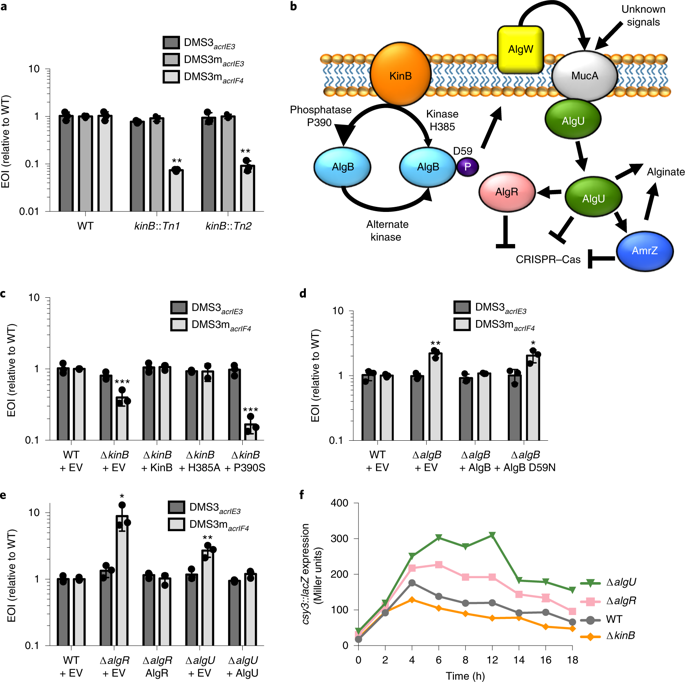当前位置:
X-MOL 学术
›
Nat. Microbiol.
›
论文详情
Our official English website, www.x-mol.net, welcomes your feedback! (Note: you will need to create a separate account there.)
Bacterial alginate regulators and phage homologs repress CRISPR-Cas immunity.
Nature Microbiology ( IF 28.3 ) Pub Date : 2020-03-23 , DOI: 10.1038/s41564-020-0691-3 Adair L Borges 1 , Bardo Castro 1 , Sutharsan Govindarajan 1, 2 , Tina Solvik 1 , Veronica Escalante 1 , Joseph Bondy-Denomy 1, 3, 4
Nature Microbiology ( IF 28.3 ) Pub Date : 2020-03-23 , DOI: 10.1038/s41564-020-0691-3 Adair L Borges 1 , Bardo Castro 1 , Sutharsan Govindarajan 1, 2 , Tina Solvik 1 , Veronica Escalante 1 , Joseph Bondy-Denomy 1, 3, 4
Affiliation

|
CRISPR-Cas systems are adaptive immune systems that protect bacteria from bacteriophage (phage) infection1. To provide immunity, RNA-guided protein surveillance complexes recognize foreign nucleic acids, triggering their destruction by Cas nucleases2. While the essential requirements for immune activity are well understood, the physiological cues that regulate CRISPR-Cas expression are not. Here, a forward genetic screen identifies a two-component system (KinB-AlgB), previously characterized in the regulation of Pseudomonas aeruginosa alginate biosynthesis3,4, as a regulator of the expression and activity of the P. aeruginosa Type I-F CRISPR-Cas system. Downstream of KinB-AlgB, activators of alginate production AlgU (a σE orthologue) and AlgR repress CRISPR-Cas activity during planktonic and surface-associated growth5. AmrZ, another alginate regulator6, is triggered to repress CRISPR-Cas immunity upon surface association. Pseudomonas phages and plasmids have taken advantage of this regulatory scheme and carry hijacked homologs of AmrZ that repress CRISPR-Cas expression and activity. This suggests that while CRISPR-Cas regulation may be important to limit self-toxicity, endogenous repressive pathways represent a vulnerability for parasite manipulation.
中文翻译:

细菌藻酸盐调节剂和噬菌体同源物抑制CRISPR-Cas免疫力。
CRISPR-Cas系统是适应性免疫系统,可保护细菌免受噬菌体(噬菌体)感染1。为了提供免疫力,RNA引导的蛋白质监视复合物可识别外来核酸,触发其被Cas核酸酶破坏2。尽管人们对免疫活性的基本要求已广为人知,但调节CRISPR-Cas表达的生理学线索却并非如此。在此,前向遗传筛选确定了以前以铜绿假单胞菌藻酸盐生物合成3,4的调节为特征的两组分系统(KinB-AlgB),作为铜绿假单胞菌IF型CRISPR-Cas系统的表达和活性的调节剂。 。在KinB-AlgB下游,藻酸盐生产AlgU(σE直系同源物)和AlgR的激活剂在浮游和表面相关生长过程中抑制CRISPR-Cas活性5。AmrZ,另一个藻酸盐调节剂6,在表面缔合后被触发抑制CRISPR-Cas免疫。假单胞菌噬菌体和质粒已经利用了这种调节方案,并携带了劫持的AmrZ同源物,从而抑制了CRISPR-Cas的表达和活性。这表明,尽管CRISPR-Cas调控对限制自身毒性可能很重要,但内源性抑制途径代表了寄生虫操纵的脆弱性。
更新日期:2020-03-23
中文翻译:

细菌藻酸盐调节剂和噬菌体同源物抑制CRISPR-Cas免疫力。
CRISPR-Cas系统是适应性免疫系统,可保护细菌免受噬菌体(噬菌体)感染1。为了提供免疫力,RNA引导的蛋白质监视复合物可识别外来核酸,触发其被Cas核酸酶破坏2。尽管人们对免疫活性的基本要求已广为人知,但调节CRISPR-Cas表达的生理学线索却并非如此。在此,前向遗传筛选确定了以前以铜绿假单胞菌藻酸盐生物合成3,4的调节为特征的两组分系统(KinB-AlgB),作为铜绿假单胞菌IF型CRISPR-Cas系统的表达和活性的调节剂。 。在KinB-AlgB下游,藻酸盐生产AlgU(σE直系同源物)和AlgR的激活剂在浮游和表面相关生长过程中抑制CRISPR-Cas活性5。AmrZ,另一个藻酸盐调节剂6,在表面缔合后被触发抑制CRISPR-Cas免疫。假单胞菌噬菌体和质粒已经利用了这种调节方案,并携带了劫持的AmrZ同源物,从而抑制了CRISPR-Cas的表达和活性。这表明,尽管CRISPR-Cas调控对限制自身毒性可能很重要,但内源性抑制途径代表了寄生虫操纵的脆弱性。



























 京公网安备 11010802027423号
京公网安备 11010802027423号